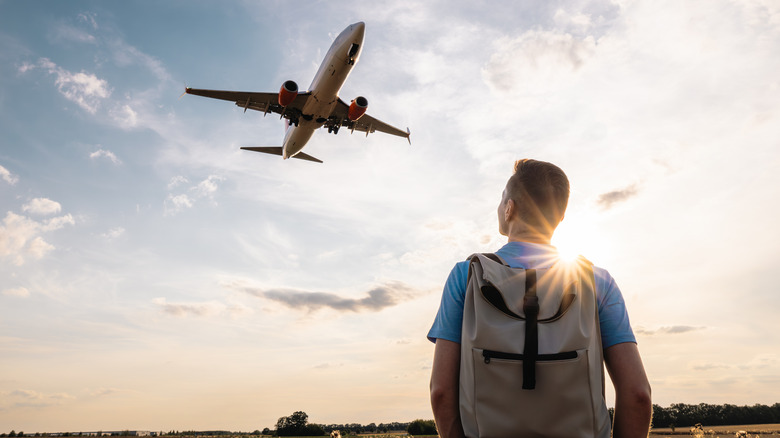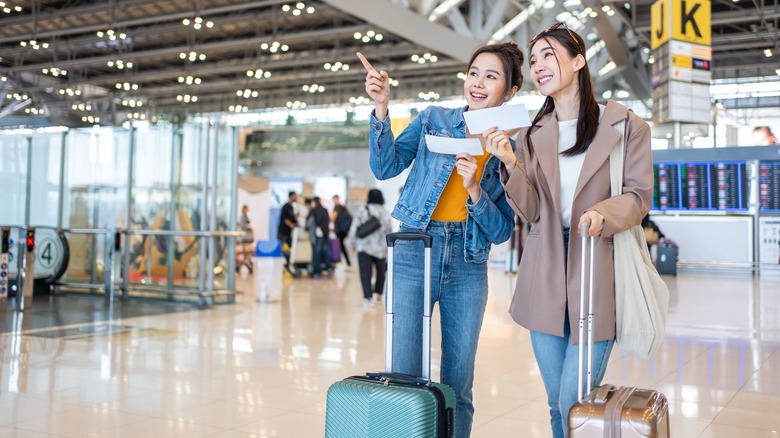Rick Steves' Son Shares His Best Trick For Finding The Most Budget-Friendly Flights
Commercial airplane travel has morphed over the years from a form of luxury transportation to a more bourgeois experience, champagne flutes having been replaced by pedestrian plastic cups. But as ticket prices have come down from the stratosphere, many of us are still confused about how to score the best deals on flights. Andy Steves, progeny of esteemed travel influencer Rick Steves and a savvy traveler in his own right, shared his views on this in a recent Zero to Travel podcast, "How to Travel Europe on a Budget w/Andy Steves." Overall, we appreciated Andy's friendly speaking style and many of his recommendations. But in conducting our own research, we found more support for some of his ideas than for others.
First, Andy acknowledged a theory floating around out there that airline tickets are cheapest if you buy them on Tuesday. Andy thinks this is "somewhat accurate," but we found some evidence that runs counter to his claim. For example, an article by Meghan Coyle on the trusted site NerdWallet maintains that "... flight prices change constantly and at all hours of the day, adjusting to real-time demand. Airlines don't restock on the same day every week like a grocery store, so you won't find deals by waiting until Tuesdays to book."
What we did discover in our research, that, is that timing does affect pricing when it comes to actual travel days. According to a 2023 study by travel booking app Hopper, the cheapest days for departing and returning domestic flights are Tuesday and Wednesday, respectively, while the cheapest day to depart/return on an international flight is Wednesday, with savings of around $60 each way on average. We always suspected that traveling on weekends is more expensive whether you're on a domestic or international flight, and now there's data to prove it!
More ways to find cheap airline tickets, per Andy
Next, Andy recommends clearing your cookies each time you search for flights. This is to prevent websites from "remembering" you and raising ticket prices when you conduct a search multiple times. As the theory goes, travel sites hook you by showing you a the lowest available ticket prices the first time you conduct a search, knowing you probably need some time to finalize your plans before purchasing a ticket. But the next time you log in to conduct the search, voilá, the site "sees" your cookies, and shows ticket price that are a little bit higher, since now you may be more likely to buy that ticket. Our research supported Andy's claim that by clearing cookies each time you visit a booking site, you can protect yourself from those little jumps in ticket prices. But a drawback of this approach is that without cookies, a site cannot recognize you and personalize your offerings. So you both gain something and lose something with this approach.
Of all of Andy's recommendations, the one we liked best is to use multiple search engines when researching flights. "I never look directly with one airline first," he says in the podcast. "What I do is I look at three different search engines at the same time." He names Skyscanner, CheapOair, and Kayak, which all have their own algorithms and will generate unique results for similar searches. Conducting simultaneous research on these three different sites using flexible dates, travel times, and layover options is like casting a wide net to catch the best prices out there, and this is an approach we can get fully behind. In addition to the sites that Andy recommends here, another search engine you can use to find the best ticket prices is Momondo, which scans offers on the sites of hundreds of online travel agencies to find the best of the best when it comes to deals on travel.

